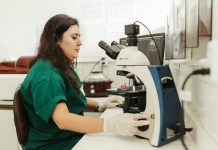
Pancreatic ductal adenocarcinoma (PDAC) is one of the most aggressive types of cancer, often referred to as a silent killer due to its alarmingly low five-year survival rate of just 8%.
For years, medical researchers have been seeking effective treatments to combat this deadly disease. Recently, a groundbreaking study from the Francis Crick Institute has opened up new possibilities in the fight against PDAC.
The research team, led by Axel Behrens, concentrated on a particular aspect of the disease: cancer stem cells within the tumor.
These cells, akin to normal stem cells that repair body tissues, are capable of initiating new tumors and morphing into various types of tumor cells. This makes them a pivotal target for potential treatments.
Published in Nature Cell Biology, the study’s most significant finding is the identification of a protein named CD9, which is consistently found on cancer stem cells throughout different stages of PDAC tumor growth. This discovery is crucial as it offers a marker to identify these elusive and dangerous cells.
More than just a marker, CD9 plays an active role in the cancer’s aggression. The study revealed that manipulating CD9 levels in mice directly affected tumor growth. Lower levels of CD9 led to smaller tumors, while higher levels resulted in larger and more aggressive tumors.
Clinically, higher CD9 levels in patients have been linked to a poorer prognosis, particularly in about 10% of PDAC patients who exhibit elevated CD9 levels.
The research didn’t stop at identification. The team delved into how CD9 influences the metabolism of cancer stem cells. They found that CD9 increases the uptake of glutamine, an essential amino acid for cancer growth.
This discovery paves the way for potential treatments that could target CD9, thereby disrupting the supply chain of nutrients essential for cancer cell survival and growth.
This breakthrough study offers a glimmer of hope in an area long clouded by despair. Understanding CD9’s role and impact brings scientists closer to developing strategies that could inhibit PDAC growth, providing a beacon of hope for many affected by this devastating disease.
While translating these findings into effective treatments might still be a long journey, the research provides a significant step forward in understanding and potentially combating one of the most challenging cancers.
For patients and their families, this advancement isn’t just scientific progress; it represents a future where winning the battle against this formidable foe might finally be within reach.
If you care about cancer risk, please read studies that exercise may stop cancer in its tracks, and vitamin D can cut cancer death risk.
For more information about cancer, please see recent studies that yogurt and high-fiber diet may cut lung cancer risk, and results showing that new cancer treatment may reawaken the immune system.
Copyright © 2023 Knowridge Science Report. All rights reserved.



